Search Results
Showing results 21 to 36 of 36
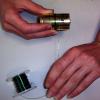
Yogurt Cup Speakers
Source Institutions
Learners build a simple electromagnet, then use this electromagnet to transform a yogurt container into a working speaker. They can connect their speaker to a radio and listen as it transmits sound.
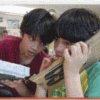
Build a Band
Source Institutions
In this design challenge activity, learners build a four-stringed instrument that can play a tune.

Sound Representation: Modems Unplugged
Source Institutions
In this activity, learners listen to songs and decode hidden messages based on the same principle as a modem. As a final challenge, learners decode the binary messages in a music video.
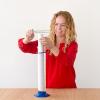
Organ Pipe: Get Bach to the fundamentals
Source Institutions
If you got a big graduated or clear cylinder, water, a pipe, and a tuning fork, you've got a sound learning opportunity! Learn about resonance with this Exploratorium Science Snack.

A Kazoo for YOU
Source Institutions
In this activity, learners will build an instrument from common household items. Explore sound through vibrations created by your vocal chords and captured by an instrument.

Coffee-Can Cuíca
Source Institutions
Make a cuíca (“kwee-ka”), a traditional Brazilian musical instrument that originated in Africa. Played primarily in Brazil, now you can play it at home, too, with this Exploratorium produced activity.

Stereo Sound
Source Institutions
We listen to stereo music systems, tv's, and radios because it simulates being where the sound originates.

Straw Oboe: Two lips make sound
Source Institutions
Oboes's unique sound originates from the two small reeds a musician blows into. Make your own double reed instrument out of straw!
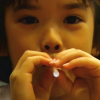
Oboe? Oh, Boy!
Source Institutions
In this activity, learners create a straw oboe to explore sound and pitch.
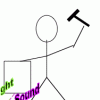
Lagging Sound
Source Institutions
In this group activity, learners see and hear the speed of sound. A learner designated the "gonger" hits a gong, once every second, as the rest of the group watches and listens from a distance.

CD Spectrometer
Source Institutions
In this activity, learners use a compact disc to make a spectrometer, an instrument used to measure properties of light.
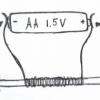
Make a Speaker
Source Institutions
In this activity, learners explore how an electromagnet works by making a simple one. Using this knowledge, learners design a diagram to make a working speaker using household materials.

Fun with Flatware: Little Experiments to Try at the Dinner Table
Source Institutions
This is a series of three quick science activities to do with a spoon, knife, and fork. In the first two activities, learners use the flatware to explore optics, mirrors, reflection, and distortion.
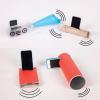
Tune Booster
Source Institutions
In this activity, learners build unique sound enhancing inventions with items from around the house to amplify sound from their smart phone's speakers.
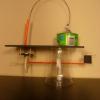
Sound Automata
Source Institutions
In this activity, learners build their own sound machines and explore the interplay of motion and sound.
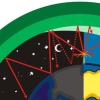
AM in the PM
Source Institutions
In this activity, learners will listen to as many radio stations as possible to discover that AM radio signals can travel many hundreds of miles at night.
